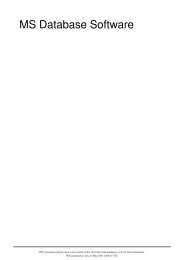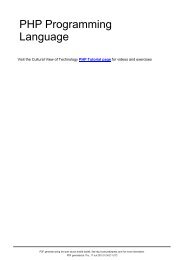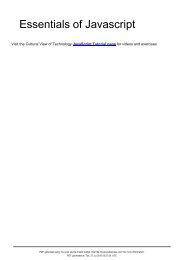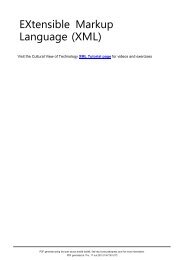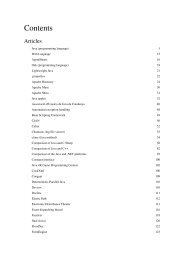Structured Query Language (SQL) - Cultural View of Technology
Structured Query Language (SQL) - Cultural View of Technology
Structured Query Language (SQL) - Cultural View of Technology
Create successful ePaper yourself
Turn your PDF publications into a flip-book with our unique Google optimized e-Paper software.
<strong>SQL</strong>/OLB 98<br />
<strong>SQL</strong>/OLB<br />
The <strong>SQL</strong>/OLB, or Object <strong>Language</strong> Bindings, extension to the <strong>SQL</strong> standard is defined by ISO/IEC 9075-10:2003.<br />
<strong>SQL</strong>/OLB defines the syntax and symantics <strong>of</strong> <strong>SQL</strong>J, which is <strong>SQL</strong> embedded in Java. The standard also describes<br />
mechanisms to ensure binary portability <strong>of</strong> <strong>SQL</strong>J applications, and specifies various Java packages and their<br />
contained classes.<br />
See also<br />
• <strong>SQL</strong><br />
• <strong>SQL</strong>:2003<br />
External links<br />
• Short description [1]<br />
References<br />
[1] http://www.jcc.com/sql.htm<br />
<strong>SQL</strong>/PSM<br />
<strong>SQL</strong>/PSM stands for <strong>Structured</strong> <strong>Query</strong> <strong>Language</strong>/Persistent Stored Modules, and was developed by the American<br />
National Standards Institute (ANSI) as an extension to <strong>SQL</strong>. [1] It was first adopted in 1996, [2] and it provides<br />
procedural programmability in addition to the querying commands <strong>of</strong> <strong>SQL</strong>.<br />
The <strong>SQL</strong>/PSM extension is defined by ISO/IEC 9075-4:2003. <strong>SQL</strong>/PSM standardizes procedural extensions for<br />
<strong>SQL</strong>, including flow <strong>of</strong> control, condition handling, statement condition signals and resignals, cursors and local<br />
variables, and assignment <strong>of</strong> expressions to variables and parameters. In addition, <strong>SQL</strong>/PSM formalizes declaration<br />
and maintenance <strong>of</strong> persistent database language routines (e.g., "stored procedures").<br />
See also<br />
• <strong>SQL</strong><br />
• <strong>SQL</strong>:2003<br />
External links<br />
Some samples <strong>of</strong> <strong>SQL</strong>/PSM functions [3]<br />
References<br />
[1] "Database <strong>Language</strong> <strong>SQL</strong>" (http://www.itl.nist.gov/div897/ctg/dm/sql_info.html). NIST <strong>SQL</strong> Project. . Retrieved February 17, 2010.<br />
[2] Celko, Joe (January 1997). "The Future <strong>of</strong> <strong>SQL</strong> Programming" (http://web.archive.org/web/20070927045233/http://www.dbmsmag.<br />
com/9701d06.html). DBMS Magazine (Miller Freeman). Archived from the original (http://www.dbmsmag.com/9701d06.html) on<br />
September 27, 2007. . Retrieved February 17, 2010.<br />
[3] http://www.pgsql.cz/index.php/<strong>SQL</strong>/PSM_Manual



